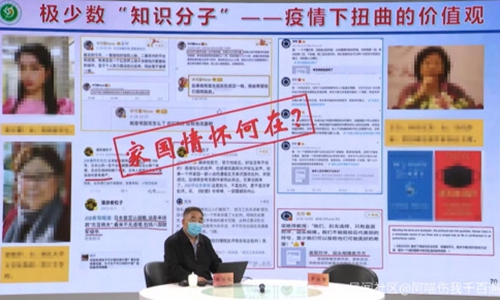Some Chinese intellectuals hold distorted values, represented by Fang Fang: academician Zhang Boli

The powerpoint that Chinese academician Zhang Boli showed during a livestreamed event on Tuesday for university students in North China's Tianjin. Zhang slammed the distorted values of a handful of Chinese intellectuals during the lecture. Photo: screenshot
When most people were positively participating in the fight against the epidemic in China, a few Chinese intellectuals ran in the opposite directions and they saw only darkness, Chinese academician Zhang Boli said during a lecture to Chinese students recently, slamming the distorted values of these handful of Chinese intellectuals.
"We have found some people running in the opposite direction, represented by Fang Fang [a writer-diarist based in Wuhan]. Some professors and students from universities made improper comments amid the epidemic, exposing their distorted values and twisted soul," Zhang said in a live-streamed event on Tuesday for university students in North China's Tianjin.
Zhang, an academician at the Chinese Academy of Engineering, was a key expert-consultant in the epidemic fight in Central China's Hubei Province. He led the country's medical staff to use traditional Chinese medicine (TCM) in fighting the COVID-19 in Hubei.
Zhang said those people did not see light, but only darkness.
At the beginning of the epidemic, there was chaos in Wuhan, but it lasted for an extremely short time. Later, the general picture in Wuhan was positive and well organized thanks to medical staff and volunteers, he said. But the Fang Fang diary only portrayed and exaggerated the chaotic scenes, and even fabricated stories could be seen in the diary.
Zhang said when COVID-19 patients died, medical staff paid respect to each and every one of them by sorting out their belongings, even if it was a piece of paper, phone, necklace, coat or a single bag. Medical staff also washed and wrapped up their bodies, before observing a silent tribute and paying their last respects in front of them, Zhang noted.
"We cannot allow patients' phones and watches to be taken to the crematorium to be burnt or scattered around [as portrayed by Fang Fang in her serialized diaries]. It is impossible. How come phones were seen scattered everywhere on crematoriums and some phones rang? It is obviously a fabricated story."
Fang Fang was trying to send some "evidence" to anti-China forces so they could attack China through those exaggerated and fabricated stories, but it got a cold reception, as the epidemic situation outside China is now far more chaotic than within China, Zhang said.
After Zhang made these comments, Fang Fang posted an online demand late Wednesday for an apology from Zhang over his comments, sparking a new wave of heated discussion on Chinese social media.
"I don't know what great achievements Zhang has made, but this will be a stain on his life, and only an apology can wash it away," Fang Fang wrote in her personal Weibo account.
The war of words prompted many Chinese netizens to criticize Fang Fang, with some hailing Zhang's bold comments and others saying Fang Fang doesn't deserve to be called an "intellectual."
"Zhang Boli is a real soldier who fought on the frontline. How can Fang Fang attack those who bled for the people?" a netizen posted.
"They want China to fall into chaos, only then can they showcase their patriotism. This is really disgusting," another Sina Weibo netizen said.
During the livestreaming event, Zhang also mentioned Chinese student Xu Kexin from the China Pharmaceutical University and Liang Yanping, a teacher from the School of Chinese Language and Literature at Hubei University. Both made improper comments during China's fight against the epidemic.
Some claimed that Liang had published online comments supporting Hong Kong separatists and visits to Japan's controversial Yasukuni Shrine years ago.